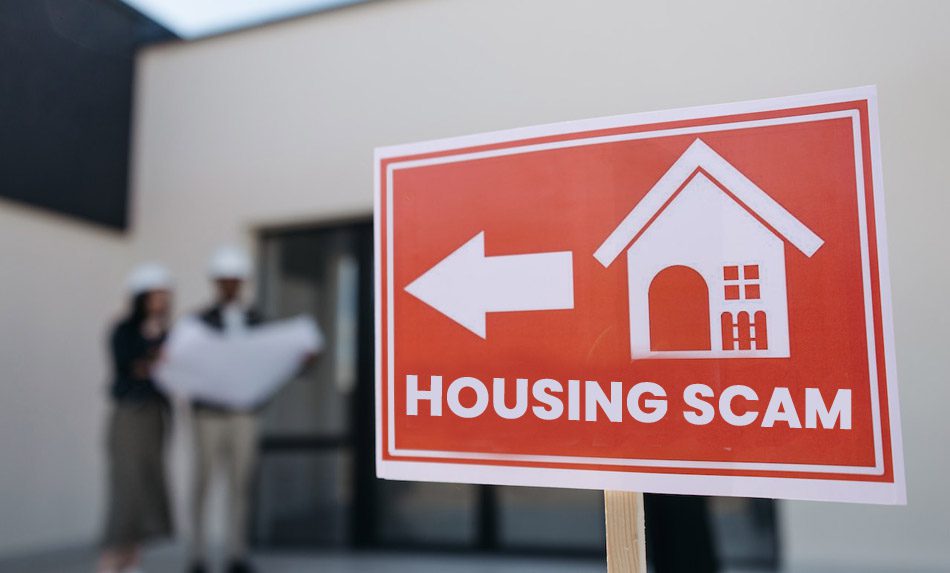Housing scams can take various forms in the US. Fraudsters use deceitful means to trick people into paying for non-existent housing services.
Rental scams are fake rental listings for properties that do not exist. Buyers may be ensnared into paying for these properties upfront, and then the scammer disappears from the scene with the money.
Likewise, foreclosure scams are also meant to deceive homeowners who struggle with their mortgage payments. Scammers contact homeowners with fake promises to help them avoid foreclosures or reduce their mortgage payments at a fee. Scammers often sweet-talk these people into paying a hefty sum that they flee with, taking advantage of their vulnerable situation.
A loan modification scam is one such scam where the fraudster negotiates with the homeowner’s mortgage lender to reduce their interest rates or monthly payments. In the run-up, they will prepare documents and convince the homeowner to sign over the deed to their property, but eventually fail those promises.
Scammers can also pretend to rescue the homeowner from foreclosure by buying the property from them and then leasing/renting it back to them at a steeper price or on unfavorable terms. The homeowner faces the risk of eviction in these types of housing scams.
Scammers can also offer home renovations at a cost much lower than the market price, use substandard materials or fail to keep their commitment. They will demand an upfront payment and then escape with it without completing the task.
Fraudsters also forge property ownership documents to sell the property or secure mortgage payments on it.
It is important to run your research before you sign in for any housing agreement. You must always buy, lease, or rent properties from verified, legitimate, and trusted sources. As a preemptive measure, you can contact the Department of Housing and Urban Development (HUD) for free assistance and advice to avoid falling for these housing scams.
Tips to Keep Yourself Protected From Housing Scams

You must be vigilant at every step of the way before entering into a transaction with individuals/agencies over housing. We list a few precautionary measures that you can apply in your situation.
Run your Research: It is important not to get trapped in a net of lies and deceit. You must research well before you enter into any housing transaction. Find more information about the property you are interested in, its landlord or seller. Look if the property is listed on legitimate property sites online. Get references and recommendations, and read any property-related documents carefully before signing on the dotted line.
Be Cautious of Upfront Payments: Scammers typically ask for an upfront amount in the guise of an application or deposit fee. You must verify the legitimacy of any such request before paying the amount.
Use Secure Payment Methods: Use a secure payment method like a credit card or PayPal. Avoid any mode that will leave you unprotected as a consumer such as wire transfers or cash or checks through the mail.
Never Share Personal Details: Never share your personal information like your Social Security Number or bank account details with anyone. Be guarded and report the matter promptly when you are asked for the same by individuals/agencies pretending to represent a reputable housing agency.
Get Home Inspection Done by a Reputable Agency: You must get your home inspection done by trusted sources or by an inspector representing a reliable agency to identify potential problems with the property.
Contact a Housing Counselor: Get in touch with the Department of Housing and Urban Development (HUD) for free assistance and advice if you are not sure about housing transactions and procedures.
How to Report a Housing Scam in the US

If you realize that you have been a victim of housing scams, or you have important information to share about a scam you discovered, you can contact the following agencies to report the matter:
- Contact the Federal Trade Commission (FTC): The Federal Trade Commission (FTC) is a government body that is responsible for protecting consumers from fraud and fraudulent practices. You can report housing scams to the FTC by visiting their official website or by calling their toll-free helpline number 1-877-382-4357.
- Contact Your State Attorney General: Each state in the US has an attorney general who is responsible for enforcing consumer protection laws. You can find the contact information for your state attorney general’s office on their website. You can also call to speak with a representative about the scam. They should be able to arrange an official appointment with the state attorney general.
- Contact Law Enforcement: You must also take the local police or sheriff’s office in the loop and bring the housing scam to light by reporting the matter formally at the local police station or sheriff’s office. They are entrusted with the responsibilities and powers to investigate such serious offenses, chase and nab the culprits, and initiate appropriate action against them.
We suggest you report a scam immediately to the appropriate authority to prevent others from falling victim to similar scams in the future. When you cooperate with law enforcement agencies in investigation processes and tracking down the culprits, you serve society in a huge way. Prosecuting scammers will deter fraudulent activities in the future.

